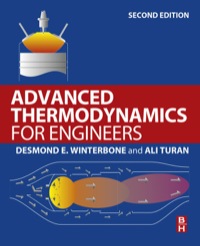An amount of pure substance equal to (1 mathrm{kmol}) undergoes an irreversible cycle. Neglecting the effects of
Question:
An amount of pure substance equal to \(1 \mathrm{kmol}\) undergoes an irreversible cycle. Neglecting the effects of electricity, magnetism and gravity, state whether each of the following relationships is true or false, giving reasons for your assertion.
(i) \(\oint \delta Q=\oint\left(\mathrm{d} u_{m}+p \mathrm{~d} v_{m}\right)\);
(ii) \(\oint \frac{\mathrm{d} u_{m}+p \mathrm{~d} v_{m}}{T}>0\);
(iii) \(\oint \delta W<\oint p \mathrm{~d} v_{m}\);
where the suffix \(m\) indicates that the quantities are in molar terms.
[False; false; true]
Fantastic news! We've Found the answer you've been seeking!
Step by Step Answer:
Related Book For 

Advanced Thermodynamics For Engineers
ISBN: 9780080999838
2nd Edition
Authors: D. E. Winterbone, Ali Turan
Question Posted:





